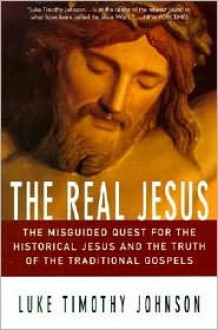The Real Jesus: The Misguided Quest for the Historical Jesus & the Truth of the Traditional Gospels
The Barnes & Noble Review What happens when you take Jesus out of church? What happens when you examine the gospel stories not merely as spiritual documents but as historical ones? When you see Jesus naturalistically, as a human being living in and interacting with society? If you are a...
show more
The Barnes & Noble Review What happens when you take Jesus out of church? What happens when you examine the gospel stories not merely as spiritual documents but as historical ones? When you see Jesus naturalistically, as a human being living in and interacting with society? If you are a Christian, what does that do to your faith? Thomas Mann once wrote, "To separate Church and religion means to give up separating the religious from madness." Something like this fear seems to motivate Luke Timothy Johnson's The Real Jesus. Besides being a New Testament scholar, Johnson is a laicized Catholic priest and former Benedictine monk, and this perspective colors his withering critique of the field of historical Jesus studies. He doesn't like this broad, unwieldy, interdisciplinary movement, this unorchestrated effort by historians, archaeologists, anthropologists, and others to find scraps of information about a certain human being who lived in Palestine two millennia ago. Professor Johnson's basic complaint is that this work is going on in the hurly-burly of society at large rather than in the sheltered cove of "the church and the academy," where he believes it belongs. This is very much in line with traditional Catholic thinking. Historically, the Church has placed itself and its representatives in an intermediary role, with the task of translating the language of the Divine into a form that ordinary humanity can comprehend — the middleman between God and the people. But this historical-Jesus business hasn't followed those rules. To the bewilderment of biblical scholars, who are used to beingignoredby everyone except their colleagues, ordinary people have been buying their books, sifting through their arcane arguments, attending lectures, buttonholing scholars who appear on radio talk shows. People are grappling with the issues on their own. And they are very big issues indeed.
show less

